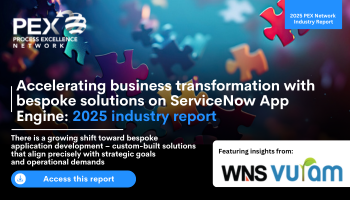AI adoption accelerates across all industries
AI is redefining job roles, OPEX and business transformation across sectors
Add bookmark
Artificial intelligence (AI) adoption is accelerating across all industries – including those less obviously exposed to AI technology. That’s according to PwC’s 2025 Global AI Jobs Barometer.
PwC analyzed nearly a billion job ads in six continents across 80 industries to determine AI’s impact on jobs, skills, wages and productivity.
The findings show that the skills sought by employers for AI-exposed jobs are changing 66 percent faster than for other roles, while workers with AI skills command a 56 percent wage premium – up from 25 percent last year.
What’s more, rather than taking jobs, the report suggests roles are growing in virtually every AI-exposed occupation.
Join the PEX Network community

Don't miss any news, updates or insider tips from PEX Network by getting them delivered to your inbox. Sign up to our newsletter and join our community of experts.
Learn MoreAI makes workers more productive
Industries more exposed to AI have a three-times higher growth in revenue per employee, with AI making workers more productive and enabling them to create more value, according to PwC. Since 2022, revenue growth in industries best positioned to adopt AI has nearly quadrupled. This suggests that investments in AI are paying off.
Wages are also being impacted, rising twice as quickly in those industries most exposed to AI compared to those least exposed, PwC found. Wages are rising for AI-powered workers even in the most highly automatable roles, suggesting that concerns that AI is devaluing automatable roles in the aggregate may be misplaced.
The value that AI-powered workers bring is apparent in the wage premium for workers with AI skills like prompt engineering, PwC stated. “We compared the wages of workers in a given occupation who differ only on whether they have AI skills. We found that on average, the wages of workers with AI skills were significantly higher. What’s more, every industry we analyzed pays wage premiums for AI skills,” PwC wrote.
Join us at All Access: AI in Business Transformation 2025 and learn how to future-proof your business with the right strategy and latest technology
AI is redefining roles, OPEX and business transformation
AI is redefining roles faster and faster – creating rapid change in the skills required to succeed in AI-powered jobs. Workers must demonstrate that they have the skills to succeed in an AI era, PwC said.
“This acceleration demands action,” said Peter Brown, global workforce leader at PwC. “To stay competitive, leaders need a clear, data-driven view of their workforce’s skills gaps and a plan to close them. The choices made today around roles, reskilling and workforce design will shape an organization’s future in the AI era.
In the PEX Report 2025, AI was found to be the biggest investment area for enhancing operational excellence (OPEX) and business transformation. Almost half of surveyed respondents said they plan to invest in AI solutions in the coming year.
More than half of businesses (58 percent) said they have discussed potential AI projects to drive OPEX and transformation objectives, while 14 percent of respondents are in the process of developing their first AI pilot project. The same number (14 percent) have piloted at least one project, with 6 percent having operationalized one AI project, dropping to 5 percent that have operationalized multiple successful AI projects.
The areas where AI is being leveraged the most are in operations (35 percent), customer service and call centers (29 percent) and data processing and management (24 percent).
Accelerating business transformation with bespoke solutions on ServiceNow App Engine

Today, off-the-shelf software solutions offer diverse features that enable vast opportunities to implement and maintain business transformation. However, in some circumstances, capabilities lack the flexibility and specificity required to address the unique challenges and workflows of individual organizations. As a result, there is a growing shift toward bespoke application development – custom-built solutions that align precisely with strategic goals and operational demands.
Download this report to explore how enterprises can harness the power of custom applications to drive meaningful transformation. With the growing adoption of low-code platforms like ServiceNow App Engine, organizations are building custom applications faster and with greater control. By empowering both IT professionals and citizen developers to build tailored solutions, organizations can significantly reduce time to value while maintaining control over quality and compliance.
Download Now













